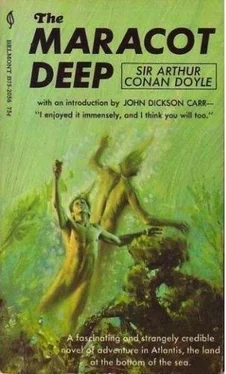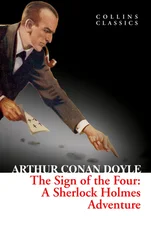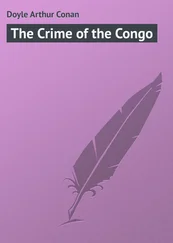Arthur Doyle - The Maracot Deep
Здесь есть возможность читать онлайн «Arthur Doyle - The Maracot Deep» весь текст электронной книги совершенно бесплатно (целиком полную версию без сокращений). В некоторых случаях можно слушать аудио, скачать через торрент в формате fb2 и присутствует краткое содержание. Жанр: Фантастика и фэнтези, на английском языке. Описание произведения, (предисловие) а так же отзывы посетителей доступны на портале библиотеки ЛибКат.
- Название:The Maracot Deep
- Автор:
- Жанр:
- Год:неизвестен
- ISBN:нет данных
- Рейтинг книги:4 / 5. Голосов: 1
-
Избранное:Добавить в избранное
- Отзывы:
-
Ваша оценка:
- 80
- 1
- 2
- 3
- 4
- 5
The Maracot Deep: краткое содержание, описание и аннотация
Предлагаем к чтению аннотацию, описание, краткое содержание или предисловие (зависит от того, что написал сам автор книги «The Maracot Deep»). Если вы не нашли необходимую информацию о книге — напишите в комментариях, мы постараемся отыскать её.
The Maracot Deep — читать онлайн бесплатно полную книгу (весь текст) целиком
Ниже представлен текст книги, разбитый по страницам. Система сохранения места последней прочитанной страницы, позволяет с удобством читать онлайн бесплатно книгу «The Maracot Deep», без необходимости каждый раз заново искать на чём Вы остановились. Поставьте закладку, и сможете в любой момент перейти на страницу, на которой закончили чтение.
Интервал:
Закладка:
The story was complete. We could ask for no more, since our own brains and imagination could supply the rest. We realized the slow remorseless descent of that great land lower and lower into the abyss of the ocean amid volcanic convulsions which threw up submarine peaks around it. We saw it in our mind’s eye stretched out, over miles of what was now the bed of the Atlantic, the shattered city lying alongside of the ark or refuge in which the handful of nerve-shattered survivors were assembled. And then finally we understood how these had carried on their lives, how they had used the various devices with which the foresight and science of their great leader had endowed them, how he had taught them all his arts before he passed away, and how some fifty or sixty survivors had grown now into a large community, which had to dig its way into the bowels of the earth in order to get room to expand. No library of information could make it clearer than that series of pictures and the inferences which we could draw from them. Such was the fate, and such the causes of the fate, which overwhelmed the great land of Atlantis. Some day far distant, when this bathybian ooze has turned to chalk, this great city will be thrown up once more by some fresh expiration of Nature, and the geologist of the future, delving in the quarry, will exhume not flints nor shells, but the remains of a vanished civilization, and the traces of an old-world catastrophe.
Only one point had remained undecided, and that was the length of time since the tragedy had occurred. Dr. Maracot discovered a rough method of making an estimate. Among the many annexes of the great building there was one huge vault, which was the burial-place of the chiefs. As in Egypt and in Yucatan, the practice of mummifying had been usual, and in niches in the walls there were endless rows of these grim relics of the past. Manda pointed proudly to the next one in the succession, and gave us to understand that it was specially arranged for himself.
“If you take an average of the European kings,” said Maracot, in his best professional manner, “you will find that they run to above five in the century. We may adopt the same figure here. We cannot hope for scientific accuracy, but it will give us an approximation. I have counted the mummies, and they are four hundred in number.”
“Then it would be eight thousand years?”
“Exactly. And this agrees to some extent with Plato’s estimate. It certainly occurred before the Egyptian written records begin, and they go back between six and seven thousand years from the present date. Yes, I think we may say that our eyes have seen the reproduction of a tragedy which occurred at least eight thousand years ago. But, of course, to build up such a civilization as we see the traces of, must in itself have taken many thousands of years.
“Thus,” he concluded — and I pass the claim on to you — we have extended the horizon of ascertained human history as no men have ever done since history began.”
Chapter 5
It was about a month, according to our calculations, after our visit to the buried city that the most amazing and unexpected thing of all occurred. We had thought by this time that we were immune to shocks and that nothing new could really stagger us, but this actual fact went far beyond anything for which our imagination might have prepared us.
It was Scanlan who brought the news that something momentous had happened. You must realize that by this time we were, to some extent, at home in the great building; that we knew where the common rest rooms and recreation rooms were situated; that we attended concerts (their music was very strange and elaborate) and theatrical entertainments, where the unintelligible words were translated by very vivid and dramatic gestures; and that, speaking generally, we were part of the community. We visited various families in their own private rooms, and our lives — I can speak for my own, at any rate — were made the brighter by the glamour of these strange people, especially of that one dear young lady whose name I have already mentioned. Mona was the daughter of one of the leaders of the tribe, and I found in his family a warm and kindly welcome which rose above all differences of race or language. When it comes to the most tender language of all, I did not find that there was so much between old Atlantis and modern America. I guess that what would please a Massachusetts girl of Brown’s College is just about what would please my lady under the waves.
But I must get back to the fact that Scanlan came into our room with news of some great happening.
“Say, there is one of them just blown in, and he’s that excited that he clean forgot to take his glass lid off, and he was jabbering for some minutes before he understood that no one could hear him. Then it was Blah Blah Blah as long as his breath would hold, and they are all following him now to the jumping-off place. It’s me for the water, for there is sure something worth our seeing.”
Running out, we found our friends all hurrying down the corridor with excited gestures, and we, joining the procession, soon formed part of the crowd who were hurrying across the sea bottom, led by the excited messenger. They drove along at a rate which made it no easy matter for us to keep up, but they carried their electric lanterns with them, and even though we fell behind we were able to follow the gleam. The route lay as before, along the base of the basalt cliffs until we came to a spot where a set of steps, concave from long usage, led up to the top. Ascending these, we found ourselves in broken country, with many jagged pinnacles of rock and deep crevasses which made it difficult travelling. Emerging from this tangle of ancient lava, we came out on a circular plain, brilliant by the phosphorescent light, and there in the very centre of it lay an object which set me gasping. As I looked at my companions I could see from their amazed expression how fully they shared my emotion.
Half embedded in the slime there lay a good-sized steamer. It was tilted upon its side, the funnel had broken and was hanging at a strange angle, and the foremast had snapped off short, but otherwise the vessel was intact and as clean and fresh as if she had just left the dock. We hurried towards her and found ourselves under the stern. You can imagine how we felt when we read the name “Stratford, London”. Our ship had followed ourselves into the Maracot Deep.
Of course, after the first shock the affair did not seem so incomprehensible. We remembered the falling glass, the reefed sails of the experienced Norwegian skipper, the strange black cloud upon the horizon. Clearly there had been a sudden cyclone of phenomenal severity and the Stratford had been blown over. It was too evident that all her people were dead, for most of the boats were trailing in different states of destruction from the davits, and in any case what boat could live in such a hurricane? The tragedy had occurred, no doubt, within an hour or two of our own disaster. Perhaps the sounding-line which we had seen had only just been wound in before the blow fell. It was terrible, but whimsical, that we should be still alive, while those who were mourning our destruction had themselves been destroyed. We had no means of telling whether the ship had drifted in the upper levels of the ocean or whether she had lain for some time where we found her before she was discovered by the Atlantean.
Poor Howie, the captain, or what was left of him, was still at his post upon the bridge, the rail grasped firmly in his stiffened hands. His body and that of three stokers in the engine-room were the only ones which had sunk with the ship. They were each removed under our direction and buried under the ooze with a wreath of sea-flowers over their remains. I give this detail in the hope that it may be some comfort to Mrs. Howie in her bereavement. The names of the stokers were unknown to us.
Читать дальшеИнтервал:
Закладка:
Похожие книги на «The Maracot Deep»
Представляем Вашему вниманию похожие книги на «The Maracot Deep» списком для выбора. Мы отобрали схожую по названию и смыслу литературу в надежде предоставить читателям больше вариантов отыскать новые, интересные, ещё непрочитанные произведения.
Обсуждение, отзывы о книге «The Maracot Deep» и просто собственные мнения читателей. Оставьте ваши комментарии, напишите, что Вы думаете о произведении, его смысле или главных героях. Укажите что конкретно понравилось, а что нет, и почему Вы так считаете.











